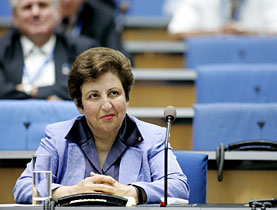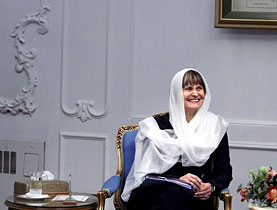Peace prize winner attacks Calmy-Rey over Iran

Iranian Nobel Peace Prize laureate Shirin Ebadi has criticised Swiss Foreign Minister Micheline Calmy-Rey over her recent controversial trip to Iran.
The lawyer and human rights campaigner was in Geneva on Monday taking part in a panel discussion on human rights abuses in Iran.
Shirin Ebadi, who won the Nobel Peace Prize in 2003 for her work on human rights and democracy, said she disagreed with Calmy-Rey’s conduct during her visit. She has spoken out on human rights issues in Iran and has defended clients in a number of high profile rights cases.
During a one-day trip to Tehran in March, Calmy-Rey held talks on Iran’s nuclear policy and on human rights, and attended the signing of an agreement on gas supply between Tehran and a private Swiss energy company, EGL.
The gas deal brought furious responses from several quarters – most notably Israel, Jewish organisations and the United States.
The Swiss foreign minister rejected criticism of her visit; she said was a model of diplomacy and business working hand in hand. She denied allegations that she was used by the Iranian authorities in an attempt to bypass international sanctions.
swissinfo: During their recent visits to Iran, both Calmy-Rey and UN High Commissioner for Human Rights Louise Arbour wore headscarves. What’s your position on this issue?
Shirin Ebadi: I really don’t care if they cover their hair or not. What disappointed me was Calmy-Rey’s attitude during her visit. She knew about the human rights situation in Iran; I even had the chance to speak to her about it beforehand.
But once there she never mentioned the human rights situation in Iran, nor met any human rights defenders, not even myself. The only thing of interest to her was the business deal.
Louise Arbour had quite a different attitude. On the first day she met members of civil society and visited women’s prisons and showed that these people were also important.
swissinfo: In your last report you talk about human rights abuses in Iran. What are these exactly?
S.E.: In Iran any criticism is assimilated under “action against national security”. There are more and more arrests of journalists, students and women for this reason. This is the case if a woman disagrees with her husband taking a second wife.
Newspapers are being closed. Recently a very progressive women’s rights monthly newspaper was closed down. Followers of the Bahá’í faith (founded by Baha’u’llah in Iran in the 19th century) are arrested for “actions against national security” and unable to speak to lawyers.
In 1975 Iran ratified the pact on social, economic, cultural, civil and political rights, which forbids corporal or degrading punishment, like torture. But the government continues to practice flogging, amputation and stoning.
Although the number of death sentences fell by 70 per cent in China, it rose by 60 per cent in Iran, compared with previous years. Even blasphemy is punishable by the death penalty.
In Iran it’s legal to execute minors. Under the law, the age of criminal responsibility is nine for a girl and 15 for a boy. Today, more than one hundred youngsters under 18 are waiting to be executed.
swissinfo: Around 65 per cent of Iranian university students are now women. Is this leading to changes in society?
S.E.: First of all, it means that in Iran women are becoming better educated than men.
There have been reforms to laws relating to the family, but on the whole they have been insufficient. The law concerning child maintenance has been modified in favour of the mother, and wives who are mistreated can seek divorce.
But laws ratified following the Iranian Revolution in 1979, which are contrary to women’s freedoms, are still in place. For example, when drawing up compensation after an accident women have half the value of men, or during a trial, a declaration by a man is worth the same as that of two women.
swissinfo: In Muslim countries, there is a movement calling for a return to the roots of the Koran to ensure women’s liberation. What’s your opinion ?
S.E.: Like all religions, Islam is subject to several interpretations. In Europe some churches marry homosexuals, while others condemn this practice; but all of them are Christian.
The same goes for Islam. In Saudi Arabia women are not allowed to drive or be involved in politics, while in Indonesia for the past 15 years women have been able to accede to the presidency. Tunisia bans polygamy, while Iran authorises it.
swissinfo: Do you think Iran can continue to be governed by Sharia law?
S.E.: The Iranian people should be the ones who decide. But if the Iranians call for Sharia, the law should be compatible with the respect of freedoms.
A correct reading of Sharia law should allow us to end discrimination between men and women, while respecting our Muslim identity.
At the beginning of the Iranian Revolution, the Mullahs cited Islamic law to refuse according the guardianship of children to women. After 20 years’ struggle, the authorities ended up reforming the law.
swissinfo-interview: Carole Vann
During her one-day trip to Tehran, Calmy-Rey said she had broached human rights in talks with her Iranian counterpart Manoucher Mottaki.
She said she had criticised the increasing use of the death penalty and corporal punishment in Iran.
Calmy-Rey said her visit to Tehran helped maintain a human rights dialogue, which was formalised five years ago.
She told a news conference in Bern that “being a neutral country does not mean being indifferent to human rights violations”.
Persia – as Iran was then known – opened an embassy in Bern in 1917.
In 1919 Switzerland opened a consulate general in Tehran.
In 2005 there were 187 Swiss citizens living in Iran.
At the end of 2004, 3,801 Iranians were living in Switzerland.
Shirin Ebadi won the Nobel Peace Prize in 2003 for her work on human rights and democracy. She is the first Muslim woman to be awarded the prize.

In compliance with the JTI standards
More: SWI swissinfo.ch certified by the Journalism Trust Initiative



You can find an overview of ongoing debates with our journalists here. Please join us!
If you want to start a conversation about a topic raised in this article or want to report factual errors, email us at english@swissinfo.ch.